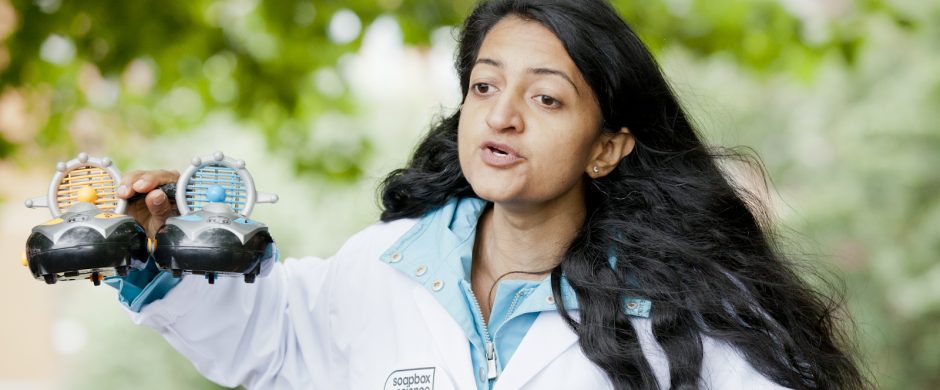On Friday June 1st 2018 between 2 and 5 pm, female scientists from different corners of the world will step onto their soapboxes to tell you about the fascinating work they do. This will be the third soapbox science event in Berlin. After a successful introduction to Germany last year, this format of empowering female scientists is becoming a big hit and growing across the country. In Berlin, talks will be both in English and German and promise to inspire you and also challenge your notions of who you think a scientist is. Join us and add a little extra excitement to your Friday afternoon.
We are a team of scientists from different nationalities living in Berlin, where we study a range of topics within the life sciences. We have organised this event to fulfill our common goals: make science available for people of all backgrounds and ages, and empower future female scientists.
Read the blog by the Berlin organising team to find out how they brought Soapbox Science to Germany and if you’d like to see what Soapbox Science looks like in action, have a look at the Soapbox Science 2015 video
Details of the location and timing of the event
Date: Friday 1st June 2018
Address: Park at Gleisdreieck, Möckernstraße, Berlin
Time: 2pm – 5pm
Sponsors
We couldn’t run this Berlin event without the generous logistical and financial support of our sponsors.
Grün Berlin association is responsible for the management of various public spaces in Berlin, creating opportunities for the public to participate in several cultural and outdoor activities. In line with its purpose, Grün Berlin is contributing to our event by providing a fantastic location for this event to take place as well as helping with advertising it.
Thanks to the creativity and professionalism of the Hellweg team, Soapbox Science Berlin has four beautifully made and very robust soapboxes. Hellweg provided all the materials and constructed the soapboxes targeting our very unique needs. Our speakers will definitely present their work with a lot of style! Soapboxes were built in such a fantastic way that we can easily store them and keep on using them for many years to come.
We would finally like to thank the Leibniz Institute for Zoo and Wildlife Research (IZW) for providing T-shirts for our event. The IZW has knowledgeable staff working with public relations, who are always ready to help events like ours.
Founding sponsors
These founding sponsors are the reason Soapbox Science now has the opportunity to grow not only in Berlin but also throughout Germany. Without their support and belief in this cause, we would not have been able to reach so far.
It would not have been possible to organize the Berlin events without the support of the Cluster of Excellence NeuroCure and the Einstein Center for Neurosciences Berlin. Their substantial financial contribution allowed us to invite speakers from different parts of Germany through travel reimbursements and the organisation of a post-event networking dinner. Both of these are crucial for promoting good scientific discussion across different STEMM fields. We are particularly grateful for their availability in working closely together with the team and providing indispensable support throughout the organisation process.
The Leibniz Institute of Freshwater Ecology & Inland Fisheries (IGB) has been a tremendous supporter of Soapbox Science Berlin since the beginning. IGB is a research institute with a highly interdisciplinary profile, researching questions of high scientific and/or societal relevance, such as those related to fish behaviour, freshwater quality and the effects of climate change on both. By providing substantial logistical and financial support, the IGB contributes to the success of this initiative.
Speakers
Selected from a competitive pool of researchers, our 12 speakers will be sharing their work in technology, science, medicine and engineering. The speakers and their discussion topics are:
Dr. Foteini Vervelidou , GFZ German Research Centre for Geosciences “The magnetic song of rocks: from the bottom of the oceans to outer space”
Dr Gabrielle Thomas, Leibniz Institute for Crystal Growth (IKZ) / M Squared Lasers “Lasers in space: seeing the world from a new perspective”
Pascale Eede (@PascaleEede), Charité Universitätsmedizin Berlin, Department of Neuropathology “Curing Alzheimer’s Disease: Shooting for the Stars”
Divya Seernani (@DSeernani), Department of Child and Adolescent Psychiatry, University Hospital Freiburg “I see it in your eyes: What Eye-movements can tell us about Brain and Behaviour”
Dr. Dr. Ana-Maria Olteteanu (@amo_sci), Freie Universität Berlin, Creative Cognitive Systems, Human Centered Computing, Mathematics and Informatics Department “Creative problem solving by humans and computers”
Dr. habil. Ilona M. Otto (@ilonamotto), Potsdam Institute for Climate Impact Research “Inducing social tipping to a fossil fuel free world”
Dr Ana Alonso (@aalonsoserrano), Max Planck Intitute for Gravitational Physics (Albert Einstein Institute) “Einstein’s theory of gravity and the discovery of gravitational waves”
Anna Jäger, Leibniz-Institute of Freshwater Ecology and Inland Fisheries (IGB) “What happens to pharmaceuticals when they end up in rivers? – a study of micropollutants in the Berliner River Erpe”
Dr Sandra Kerbler, Max-Planck-Institute of Molecular Plant Physiology “Plants, they’re smarter than we think!”
Dr. Morelia Urlaub (@morelia_ur), GEOMAR Helmholtz Centre for Ocean Research Kiel “The old volcano and the sea: volcanic flank collapses and tsunamis”
Dr. Teresa Morganti (@teresamorganti), Max Planck Institute for Marine Microbiology “Stranger things in the deep-sea: marine sponge gardens discovered in the unexplored Arctic Sea.”
Dr Maja Grubisic (@Maja_Grubisic), Leibniz-Institute of Freshwater Ecology and Inland Fisheries & Freie Universität Berlin “Saving the night // what’s the harm of light pollution?”
